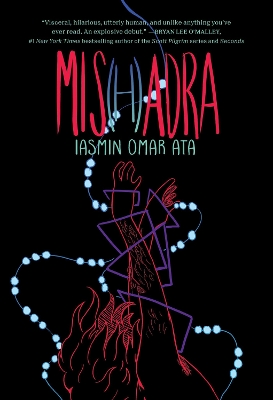Reviewed by Quirky Cat on
Mis(h)andra tells the story of Isaac, and Arab-American whom is struggling to come to terms with his epilepsy while having essentially no support structure. Along with his condition he has an unsupportive family, college problems, and the day to day issues, many of which can trigger an epileptic fit. If this wasn’t enough for a young man on his own to deal with, throw in the fact that he has yet to find a doctor that will truly listen to him, and you have the perfect recipe for despair.
The artist uses knifes to symbolize Isaac’s epilepsy – a move that is both bold and beautiful. Combined with a stunning color palette and rich imagery, it fully immerses the reader in the struggles and emotions that Isaac is being forced to cope with. I absolutely love all of the artistic choices made, right down to the simplest and smallest details.
There are some triggering subjects covered throughout the graphic novel. Isaac struggles with suicidal thoughts (stemming from the belief that he will never be himself again, that there’s no hope, no cure). The author doesn’t hide from these emotions that Isaac feels. Isaac also faces multiple uncaring medical professionals whom seem to prefer to assume he’s not really sick, as opposed to listening to him and giving him a proper diagnosis. During one of Isaac’s epileptic fits he loses an eye – the imagery around it is somewhat graphic, in part because of the way he illustrates his condition.
I sincerely cannot get over how beautiful and powerful this book was. The imagery and the story merge into an evocative tale where the reader finds themselves rooting for the main character’s well-being. I honestly wish I could read it for the first time all over again.
For more reviews, check out Quirky Cat's Fat Stacks
Reading updates
- Started reading
- 29 September, 2017: Finished reading
- 29 September, 2017: Reviewed
